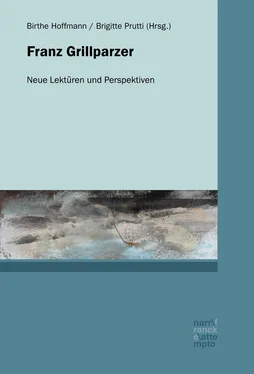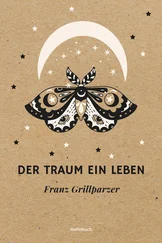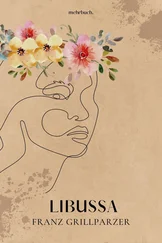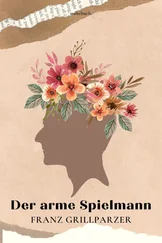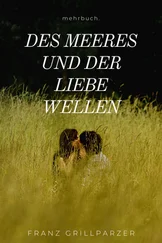Gender and Knowledge: You Can Look, But Can You Touch?
Early on in the framed narrative, the monk/Starschensky establishes a gendered view of the world. In his first encounter with Elga, Starschensky gets to listen, glimpse, and touch before he gets to look. On a trip to Warsaw – a city he has already identified to his listeners as the root of all evil1 – he is addressed during a dark night by an at first disembodied „weibliche Stimme“ that „zitternd and schluchzend“ asks him for help. Starschensky can barely discern her, but „Hals und Arme schimmerten weiß durch die Nacht.“ He follows her to a modest abode and then finds himself alone with her „auf dem dunklen Flur,“ where „[e]ine warme, weiche Hand ergreift die seinige“ (SW 3: 123). The „weibliche Stimme“ is now augmented with body parts – a white neck, white arms. The imagery hovers uncomfortably in the vicinity of necrophilic fetishism and eerily foreshadows both Starschensky’s murder of Elga and the erotic memories of her in which he continues to indulge after her death. He then pivots his story, though, and makes Elga come to life in the recollection of the touch of her „warme, weiche Hand.“ At this point in the framed narrative, Starschensky/the monk again breaks through the frame, interrupting the flow of his story to engage with his listeners. After this retardation of his increasingly erotically charged narrative, he continues:
Ein bis dahin unbekanntes Gefühl ergriff den Grafen bei der Berührung der warmen Hand. Sie erzählen ein morgenländisches Märchen von einem, dem plötzlich die Gabe verliehen ward, die Sprache der Vögel und andern Naturwesen zu verstehen, und der nun, im Schatten liegend am Bachesrand, mit freudigem Erstaunen rings um sich überall Wort und Sinn vernahm, wo er vorher nur Geräusch gehört und Laute. So erging es dem Grafen. Eine neue Welt stand vor ihm auf, und bebend folgte er seiner Führerin, die eine kleine Türe öffnete, und mit ihm in ein niederes, schwacherleuchtetes Zimmer trat. (SW 3: 124 [my italics])
Here, the touch of a woman’s hand produces an affect which in turn touches („ergriff“) Starschensky. The circuitous mediatedness of this description of Ergriffenheit is heightened by the interpolation of a reference to yet another narrative, a „morgenländisches Märchen.“ The exoticism inherent in the adjective „morgenländisch“ foreshadows the exoticized perception of the warm hand’s owner, whose appearance will be revealed in the first „Strahl des Lichtes“ (SW 3: 124) that will soon penetrate the „niederes, schwacherleuchtetes Zimmer.“ For now, the light-filled natural world of the „morgenländisches Märchen“ and the „neue Welt“ that opens up to Starschensky stand in odd contrast to the scene’s actual claustrophobic and dimly lit setting.2
The fact that the touch of Elga’s hand conjures in Starschensky/the monk associations to a fairy tale about the ability to understand the language of animals is no accident. Constance Classen links „the gendered nature of perception“ to „the scriptural account of the Fall“ and the hierarchy of the senses:
Touch, taste and smell were generally held to be the lower senses and thus were readily linked to the lower sex – women. Similar associations were made between touch, taste, and smell and the lower classes, the lower (non-European) races, and […] the lower species. […] [Women’s] association with the senses of touch, taste, and smell reinforced the cultural link between femininity and the body, for these senses were closely tied to intimate bodily experience. The distance senses of sight and hearing, by contrast, were associated with the perception of the external, masculine world.3
We might read the association of the orientalist world of the fairy tale with the touch of a woman’s hand as the lure of a feminine world that, under the veneer of the peaceful image of nature and exotic animals, is not open and enlightened, but beastly and base, narrow and dark like the room Starschensky enters with Elga. The idea that the codes of this feminine world are actually meaningful, that they have „Wort und Sinn,“ is literally a fairy tale. The reality is that a world associated with racial others and women has nothing to offer but „Geräusch“ und „Laute.“ The touch of a woman’s hand opens the door merely to carnal knowledge.
Creation and Procreation: Generating Doubt
As the framed narrative proceeds, it becomes ever more clear that there is no way to separate an epistemology of touch and its associations with nature, femininity, and physical intimacy from an epistemology of sight and its associations with culture, masculinity, and distance. For one, after Starschensky’s sensuous side is awakened by the touch of the girl’s hand, he finally gets to look at her face and her entire body, and he concludes that she is „schön in jedem Betracht.“ She has curly black hair, light blue eyes, and „üppig aufgeworfene[…], beinahe zu hochrote[…] Lippen“ (SW 3: 124). Now that he has had a look, Starschensky would clearly like to touch again. Elga pleads for help for her father, a nobleman who has fallen into poverty when his properties were seized as a result of the anti-patriotic political activities in which his two sons engaged.1 The sons, along with their co-conspirators, are banished. Elga’s appeal to Starschensky’s „ritterliche[n] Instinkt”2 is successful. Starschensky uses his wealth and his influence to restore Elga and her father to a decent living situation and is able to help lift the banishment of Elga’s brothers. They soon return home, along with an „entfernter Verwandter des Hauses,“ Oginsky (SW 3: 125). Starschensky continues to support Elga and her family – not without an ulterior motive, as he has fallen for Elga. In the monk’s/Starschensky’s telling, it is clear that Elga’s father would welcome a marriage between his daughter and Starschensky, as such a bond would secure the family’s financial future. In essence, Elga is traded for money:3 to save his and his sons’ financial and political future, a father barters away his daughter to a wealthy older man.4 Elga’s perspective on all of these matters must remain obscured – not only is the narrative told from Starschensky’s point of view, but when we learn of her murder later on, we understand, of course, that her voice has been silenced for good.
In the monk’s/Starschensky’s resentment-tinged telling, he mortgages his properties to pay for his wife’s family’s cost of living, to support the expensive habits of her brothers, and to finance Elga’s taste for fancy clothing, jewelry, and festivities in the city. Finally alerted to the growing precarity of his own financial circumstances, Starschensky proposes to his wife a move back to his family properties in the countryside, a move to which Elga readily agrees, not least because she is pregnant. An „engelschönes, kleines Mädchen“ (SW 3: 129) is born, and life seems reasonably good for a while. Of the daughter, we hear:
Kaum konnte aber auch etwas Reizenderes gedacht werden, als das kleine, rasch sich entwickelnde Mädchen. In allen schon angekündigten Formen der Mutter Abbild, schien sich die schaffende Natur bei dem holden Köpfchen in einem seltsamen Spiele gefallen zu haben. Wenn Elga bei der Schwärze ihrer Haare und Brauen durch ein hellblaues Auge auf eine eigene Art reizend ansprach, so war bei dem Kinde diese Verkehrung des Gewöhnlichen nachgeahmt, aber wieder verkehrt; denn goldene Locken ringelten sich um das zierliche Häuptchen, und unter langen blonden Wimpern barg sich, wie ein Räuber vor der Sonne, das große schwarzrollende Auge. Der Graf scherzte oft über diese, wie er es nannte, auf den Kopf gestellte Ähnlichkeit, und Elga drückte dann das Kind inniger an sich und ihre Lippen hafteten auf den gleichgeschwellten, strahlenden von gleichem Rot. (SW 3: 130 [my italics])
Читать дальше
